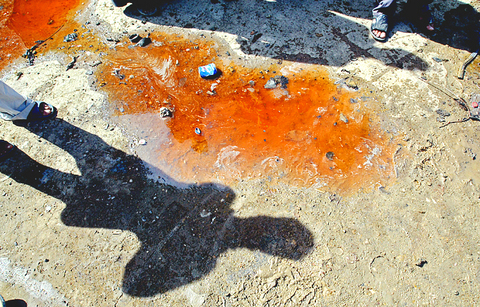Iraq's Shiite Alliance said yesterday it would ask President Jalal Talabani to postpone the opening of parliament "for a few days" to give them more time to break a deadlock delaying the formation of a new government.
Talabani, a Kurd, announced on Monday he would convene parliament on Sunday, just meeting a constitutional deadline for him to summon lawmakers following the final results of the Dec. 15 parliamentary election being certified.
But nearly three months after the election, Iraq's political leaders are still fighting over who should be the new prime minister in Iraq's first full-term, four-year government.

PHOTO: AFP
The Shiite Alliance, by far the biggest bloc in the new parliament, is facing mounting pressure from would-be partners to ditch Prime Minister Ibrahim al-Jaafari, whom critics say has failed to staunch sectarian violence that has killed hundreds and pushed Iraq to the brink of civil war.
The political stalemate has complicated efforts to form a national unity government of Shiites, Sunnis and Kurds that Washington is promoting as the best hope of stabilizing Iraq and allowing it to begin pulling out its troops.
Iraq's Defense Ministry said the army was investigating how a gunman managed to kill Major General Mubdar Hatim al-Dulaimi, a Sunni Muslim who commanded the 10,000-strong 6th Division in Baghdad, on Monday.
The general was wearing body armor, a ministry official said. He opened the door of his four-wheel drive vehicle and a single bullet struck his head as he was putting on his helmet.
"The gunmen had very precise information," the official said.
Another Iraqi general said it was an assassination that needed inside information and proved the army, recruited by US officers over the past two years, had been infiltrated by factional militia groups ready to turn on fellow soldiers.
"The outsiders have hands on the inside," the general said.
The division, among the best equipped and strongest of Iraq's new forces, has been on the frontline of preventing a civil war after sectarian bloodshed erupted two weeks ago over the bombing of a Shiite shrine in the Sunni city of Samarra.
In the city of Hilla south of Baghdad, a car bomb wounded three police officers, police said, adding they imposed a ban on traffic in the center of the city after receiving information that suicide bombers were planning another attack.
Meanwhile, two Canadians and a Briton working for a Christian peace group who were kidnapped in Iraq three months ago issued a new plea for their release, according to a video broadcast on al-Jazeera yesterday.
The video was the first news of the men since late January, but conspicuously did not feature the US peace activist who had been kidnapped with them.
"Three hostages in Iraq pleaded with Arab Gulf leaders to help free them," the al-Jazeera news presenter said.

Conflict with Taiwan could leave China with “massive economic disruption, catastrophic military losses, significant social unrest, and devastating sanctions,” a US think tank said in a report released on Monday. The German Marshall Fund released a report titled If China Attacks Taiwan: The Consequences for China of “Minor Conflict” and “Major War” Scenarios. The report details the “massive” economic, military, social and international costs to China in the event of a minor conflict or major war with Taiwan, estimating that the Chinese People’s Liberation Army (PLA) could sustain losses of more than half of its active-duty ground forces, including 100,000 troops. Understanding Chinese

The Ministry of Foreign Affairs (MOFA) yesterday said it is closely monitoring developments in Venezuela, and would continue to cooperate with democratic allies and work together for regional and global security, stability, and prosperity. The remarks came after the US on Saturday launched a series of airstrikes in Venezuela and kidnapped Venezuelan President Nicolas Maduro, who was later flown to New York along with his wife. The pair face US charges related to drug trafficking and alleged cooperation with gangs designated as terrorist organizations. Maduro has denied the allegations. The ministry said that it is closely monitoring the political and economic situation

UNRELENTING: China attempted cyberattacks on Taiwan’s critical infrastructure 2.63 million times per day last year, up from 1.23 million in 2023, the NSB said China’s cyberarmy has long engaged in cyberattacks against Taiwan’s critical infrastructure, employing diverse and evolving tactics, the National Security Bureau (NSB) said yesterday, adding that cyberattacks on critical energy infrastructure last year increased 10-fold compared with the previous year. The NSB yesterday released a report titled Analysis on China’s Cyber Threats to Taiwan’s Critical Infrastructure in 2025, outlining the number of cyberattacks, major tactics and hacker groups. Taiwan’s national intelligence community identified a large number of cybersecurity incidents last year, the bureau said in a statement. China’s cyberarmy last year launched an average of 2.63 million intrusion attempts per day targeting Taiwan’s critical

‘SLICING METHOD’: In the event of a blockade, the China Coast Guard would intercept Taiwanese ships while its navy would seek to deter foreign intervention China’s military drills around Taiwan this week signaled potential strategies to cut the nation off from energy supplies and foreign military assistance, a US think tank report said. The Chinese People’s Liberation Army (PLA) conducted what it called “Justice Mission 2025” exercises from Monday to Tuesday in five maritime zones and airspace around Taiwan, calling them a warning to “Taiwanese independence” forces. In a report released on Wednesday, the Institute for the Study of War said the exercises effectively simulated blocking shipping routes to major port cities, including Kaohsiung, Keelung and Hualien. Taiwan would be highly vulnerable under such a blockade, because it